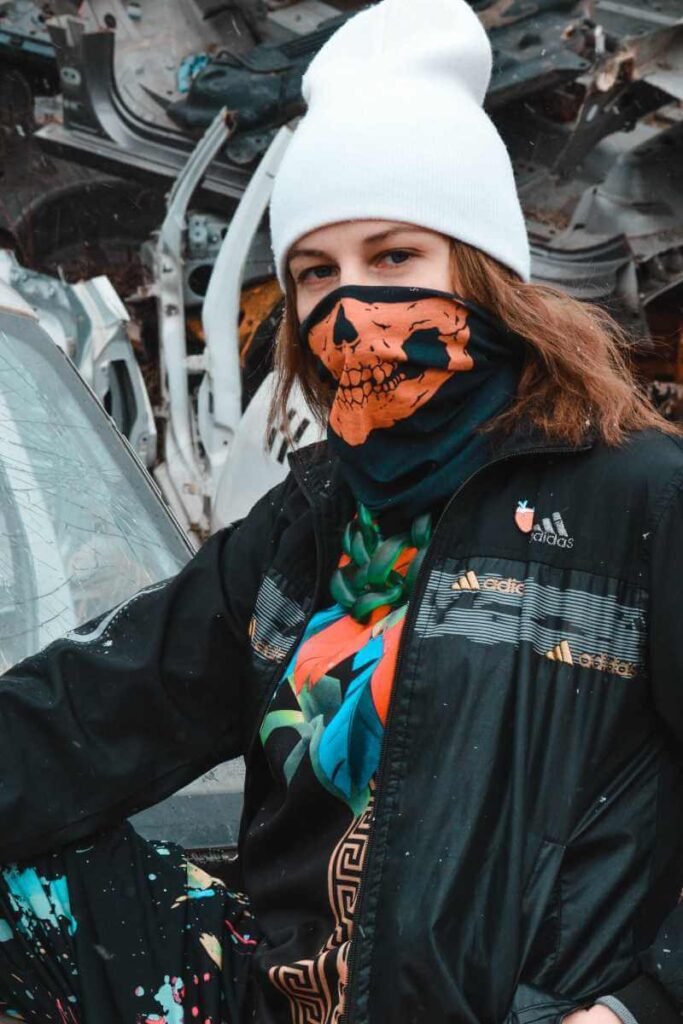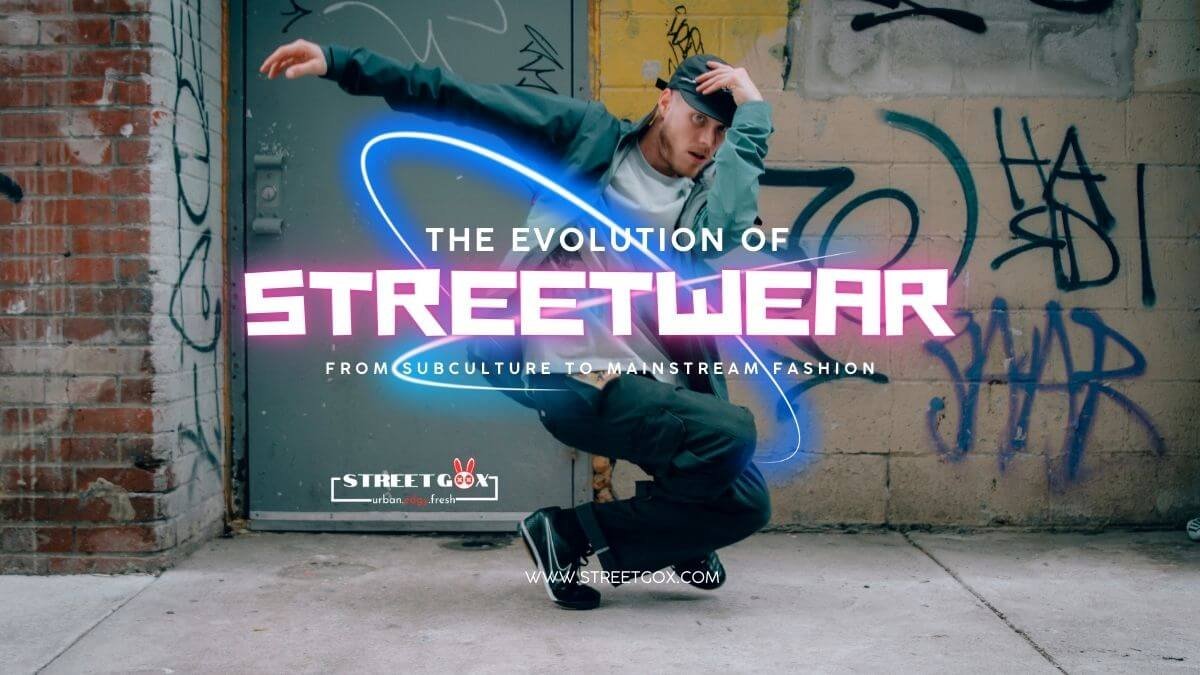Hip hop and streetwear have always been closely intertwined, with the culture of the former heavily influencing the fashion of the latter.
Over the years, hip hop has continued to have a significant impact on streetwear fashion, shaping the way people dress and influencing the industry as a whole. From the early days of breakdancing and graffiti to the present-day “hypebeast” culture, hip hop has been an integral part of the streetwear scene.
In this blog post, we’ll explore the influence of hip hop on streetwear, the rise of hip hop streetwear brands, and some of the most iconic hip hop streetwear designs. So, sit back, relax, and let’s dive into the world of hip hop and streetwear.
Table of Contents
The Relationship Between Hip Hop and Streetwear
Hip hop and streetwear have had a long-standing relationship that dates back to the birth of hip hop in the late 1970s. Hip hop emerged as a cultural force in African American and Latino communities in New York City, bringing with it a new fashion style that reflected the urban lifestyle of its creators and followers.
Early hip hop fashion was characterized by comfortable and functional clothing that reflected the culture and lifestyle of inner-city life. Tracksuits, sneakers, bucket hats, and bomber jackets were some of the key items worn by hip hop pioneers such as DJ Kool Herc, Afrika Bambaataa, and Grandmaster Flash.
As hip-hop culture evolved, so did its fashion, and this evolution had a significant impact on streetwear. In the 1990s, baggy clothes, oversized t-shirts, and hoodies became synonymous with hip hop culture, reflecting a desire for comfort and practicality in clothing. These styles quickly gained popularity in the mainstream and influenced the fashion industry as a whole.

The early 2000s saw a shift in hip hop fashion, with high-end designers such as Pharrell Williams and Kanye West becoming prominent figures in the industry. At the same time, streetwear brands like A Bathing Ape, Supreme, and Billionaire Boys Club began to emerge, catering to the growing demand for high-end streetwear.
Today, hip hop and streetwear continue to have a symbiotic relationship, with each influencing the other in a continuous cycle. Many hip hop artists have launched their own streetwear brands, including Jay-Z’s Rocawear, Kanye West’s Yeezy, and Tyler, The Creator’s Golf Wang. These brands often feature bold graphics, bright colors, and oversized silhouettes, reflecting the influence of hip hop fashion on streetwear.
In conclusion, the relationship between hip hop and streetwear is inseparable, with hip hop serving as a driving force behind the evolution of streetwear fashion. From its humble beginnings in the inner cities of New York City to its global influence today, hip hop has shaped streetwear fashion and continues to do so.
The Impact of Hip Hop on Streetwear
From the early days of hip hop to the present, the fashion choices of hip hop artists and fans have heavily influenced streetwear fashion. This influence can be seen in everything from the clothes people wear to the accessories they choose.
Hip hop has had a significant impact on streetwear fashion, shaping the way people dress and influencing the industry as a whole. Here are some of the ways hip hop has influenced streetwear:
- Embracing Athletic Apparel: Hip hop artists like Run DMC popularized the look of pairing Adidas sneakers with tracksuits, which created a new wave of athletic apparel in streetwear fashion.
- Bold Logos and Graphics: Hip hop culture introduced bold logos and graphics in streetwear fashion, inspired by record labels and album covers. This influence can be seen in brands like FUBU and Phat Farm.
- Baggy Clothing: Hip hop artists wore baggy clothing as a way to express individuality and comfort. This trend quickly became a hallmark of streetwear fashion and continues to be popular today.
- Headwear: Hip hop artists also popularized headwear such as baseball caps and bandanas, which have become staples in streetwear fashion.
- Layering: Layering has always been a key aspect of hip hop fashion, and this trend has influenced streetwear fashion as well. Hip hop artists often layered oversized clothing to create unique and bold looks, and this approach has been embraced by streetwear enthusiasts.
Key Figures in Hip Hop and Streetwear
One of the most iconic examples of the intersection of hip hop and streetwear is the partnership between Run DMC and Adidas in the 1980s. The group famously wore Adidas sneakers with no laces, which quickly became a signature look in hip hop culture. This partnership led to the creation of the first ever hip-hop sneaker, the Adidas Superstar, which is still popular today.
More recently, we’ve seen collaborations between hip hop artists and streetwear brands become increasingly common. For example, rapper Travis Scott has worked with brands like Nike and Jordan to create limited edition sneakers and clothing lines. Another example is Jay Z’s partnership with the brand Rocawear, which he co-founded in 1999 and has since become a staple in the hip hop fashion scene.
Hip Hop Streetwear Brands
1. Supreme
Supreme is perhaps the most well-known hip hop streetwear brand, with a cult following that spans the globe. Founded in 1994 by James Jebbia, Supreme started out as a small skate shop in New York City before evolving into a full-fledged streetwear brand. Supreme is known for its limited-edition releases, bold graphics, and collaborations with artists and designers from all over the world.
2. BAPE
A Bathing Ape, or BAPE, is a Japanese streetwear brand that was founded in 1993 by Nigo. BAPE’s signature camo print and bold graphics have made it a favorite among hip hop artists and fans alike. The brand is also known for its collaborations with other notable brands, including Adidas and Stussy.
3. Stüssy
Stüssy is a California-based streetwear brand that was founded in the early 1980s by Shawn Stussy. The brand’s surf-inspired designs and bold graphics have made it a staple in the hip hop community. Stüssy is also known for its collaborations with other brands, including Nike and Converse.
4. Off-White
Off-White is a luxury streetwear brand that was founded in 2012 by Virgil Abloh, a former creative director for Kanye West. The brand is known for its high-end designs, bold graphics, and collaborations with other luxury brands, including Louis Vuitton and Nike.
5. Kith
Kith is a New York City-based streetwear brand that was founded in 2011 by Ronnie Fieg. The brand’s minimalist designs and high-end collaborations have made it a favorite among hip hop artists and fashion enthusiasts. Kith is known for its collaborations with other brands, including Nike and Coca-Cola.
These are just a few examples of the many hip hop streetwear brands that have emerged over the years. Each brand has its unique style and aesthetic, but all are influenced by the culture and fashion of hip hop.
Top Collabs Between Hip Hop Artists and Streetwear Fashion
In addition to influencing individual pieces of clothing and footwear, hip hop has also played a significant role in shaping the streetwear industry as a whole. One way this has happened is through collaborations between hip hop artists and streetwear brands.
These collaborations have produced some of the most iconic and sought-after pieces of streetwear, and have helped to blur the lines between fashion and music. Here are just a few examples of the most memorable collabs between hip hop artists and streetwear fashion brands.
- Run DMC x Adidas – In the mid-1980s, hip hop group Run DMC collaborated with Adidas to create one of the most iconic sneaker designs of all time, the Adidas Superstar. The group famously wore the sneakers without laces and helped to popularize the trend of wearing sneakers as a fashion statement.
- Wu-Tang Clan x Clarks Originals – In 1995, hip hop group Wu-Tang Clan collaborated with British shoe brand Clarks Originals to create a limited-edition version of their classic Wallabee shoe. The collaboration was a nod to the group’s New York City roots and became a cult classic among both hip-hop fans and fashion enthusiasts.
- Pharrell Williams x BAPE – In the early 2000s, producer and musician Pharrell Williams collaborated with Japanese streetwear brand BAPE on a series of limited-edition t-shirts and sneakers. The collaboration helped to solidify BAPE’s status as a major player in the streetwear world and introduced many fans to the brand’s signature camo patterns.
- Kanye West x Louis Vuitton – In 2009, rapper and fashion icon Kanye West collaborated with luxury brand Louis Vuitton on a collection of sneakers. The collaboration helped to bring streetwear into the high fashion world and showed that hip hop could have a major impact on the luxury market.
- Travis Scott x Nike – In recent years, rapper Travis Scott has become known for his collaborations with Nike on limited edition sneakers. His designs have included everything from a Cactus Jack version of the Air Jordan 1 to a special edition of the Nike Dunk Low.
These collaborations between hip hop artists and streetwear fashion brands have not only helped to bridge the gap between the music and fashion industries, but have also introduced new styles and trends to a wider audience. They have also shown that hip hop culture has a lasting impact on the fashion world, and that the relationship between the two is constantly evolving.
The Future of Hip Hop and Streetwear
As the hip hop and streetwear industries continue to evolve, it’s evident that the two are still closely connected. We’ve seen a new generation of hip hop artists emerge, bringing with them a fresh perspective on both music and fashion. Many of these artists are collaborating with streetwear brands to create unique and innovative designs that reflect the current cultural moment.
One trend that is gaining momentum is a focus on sustainability. With increasing awareness of the environmental impact of fast fashion, many streetwear brands are exploring more eco-friendly options. Hip hop artists are also advocating for more sustainable fashion choices, and some have even launched their own eco-conscious brands.
Another development to keep an eye on is the growing overlap between fashion and music. We can expect to see more collaborations between hip hop artists and fashion brands, with a focus on creating new and exciting designs that challenge traditional fashion norms.
Overall, the future of hip hop and streetwear fashion is promising, with endless possibilities for creativity and innovation. As long as the two industries continue to influence and inspire each other, we can anticipate seeing new and exciting styles emerging for years to come.
FAQs
1. How did hip-hop influence streetwear?
Hip hop culture has had a significant influence on streetwear fashion, introducing new trends, styles, and aesthetics that continue to shape the industry today.
2. Where did the hip-hop streetwear trend originate?
The hip-hop streetwear trend originated in the late 1970s and early 1980s in New York City, specifically in the Bronx. As hip hop emerged as a cultural force, it brought with it a new fashion style that reflected the urban lifestyle of its creators and followers. Early hip hop fashion was heavily influenced by sportswear and athletic apparel, with tracksuits, sneakers, and baseball caps being popular choices.

